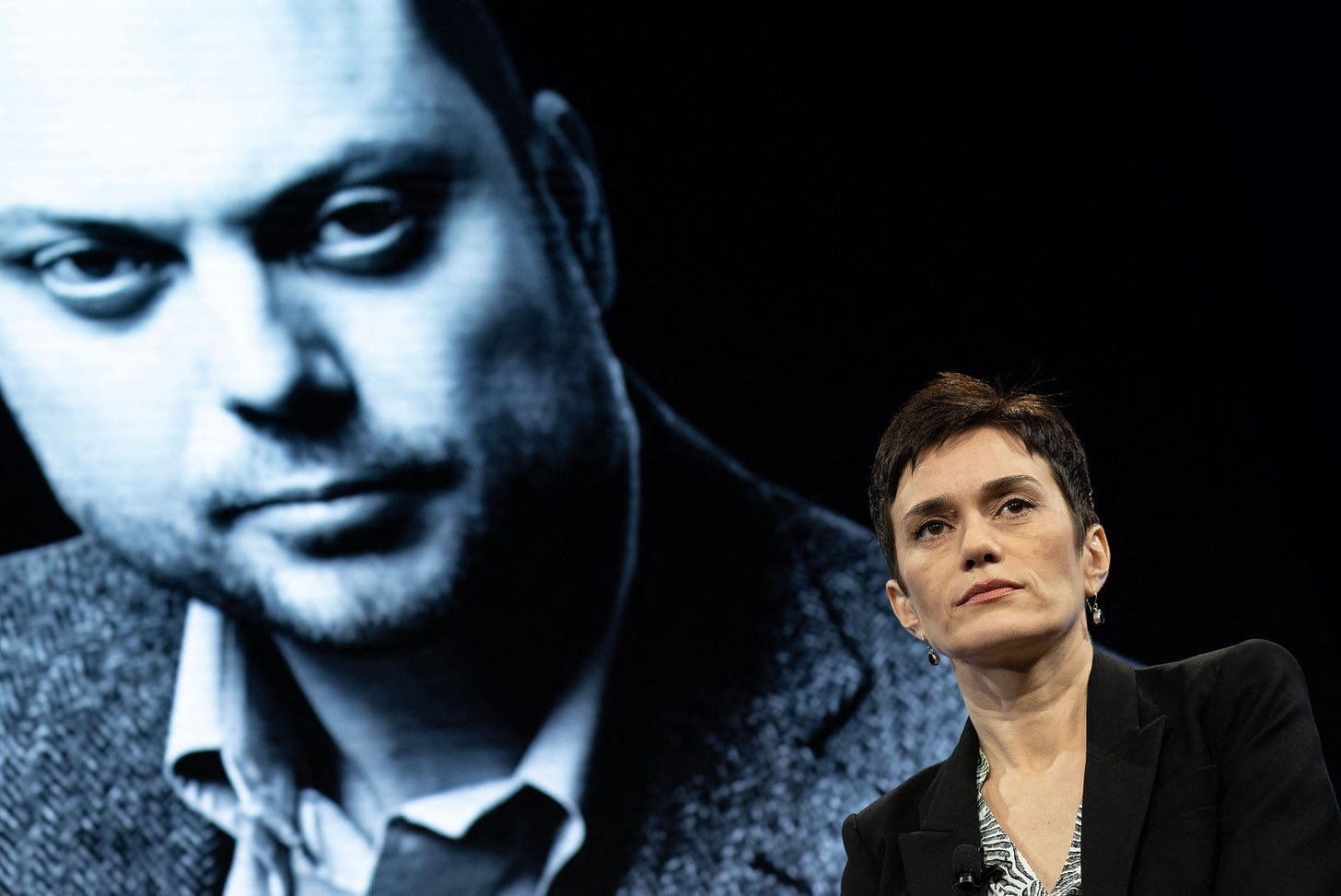The U.S. Should Help This Russian Dissident Survive
If a democratic Russia is ever to emerge after Putin someday leaves the scene, it will require individuals with the character and courage of Vladimir Kara-Murza.

THE WALL STREET JOURNAL reported last week that U.S. intelligence agencies have found Russian President Vladimir Putin culpable for the murder of democracy leader Alexei Navalny in his Siberian prison camp last February, but found that “he probably didn’t order it at that moment.”
That assessment comports with President Biden’s statement after Navalny’s death: “Make no mistake: Putin is responsible for Navalny’s death.” Putin may not have determined the time of Navalny’s murder, but he had overseen previous attempts to murder the anti-corruption activist, as well as his assignment to inhumane conditions that likely contributed to his death at age 47. Biden was right to hold Putin morally responsible.
Putin is just as responsible for the fate of another ailing Russian pro-democracy politician, Vladimir Kara-Murza.
Kara-Murza, 42, was sentenced to twenty-five years in prison for treason in April 2023 for opposing the Kremlin’s war in Ukraine. He had returned to Russia from abroad, despite having survived poisoning attacks in Moscow in 2015 and 2017. The open-source investigative organization Bellingcat found that Kara-Murza and Navalny, who was poisoned in 2020, were tracked by the same unit of the Russian Federal Security Service before their attacks. As to why he returned to his native country despite the obvious danger, Kara-Murza often said that a Russian politician has to be in Russia.
For Kara-Murza, twenty-five years in prison is equivalent to a death sentence. His health, already jeopardized by his near-fatal poisonings, is rapidly deteriorating. Earlier this year, he was transferred to a harsh regime camp, Prison Colony 7, in Omsk, 1,800 miles east of Moscow. Every day he is awakened at dawn in a cramped, dark cell. He is not allowed to lie down all day. Meals are revolting and lack nutrition. Already slim before his incarceration, he has lost almost 50 pounds.
In an attempt to break his spirit, guards trap Kara-Murza into committing “violations” of prison rules—for example, ordering him to pick up his linens off the ground, then punishing him for failing to keep his hands behind his back. He has been subject to solitary confinement in an even colder, smaller punishment cell for more than two hundred days. His family has limited contact with him and relies mainly on glimpses of him from court hearings, in which he displays his usual indomitable spirit. Kara-Murza’s severe polyneuropathy has affected his mobility. Even Russian prison rules acknowledge his condition is incompatible with imprisonment.
A designation by the State Department that Kara-Murza is “wrongfully detained” would marshal U.S. diplomatic and bureaucratic efforts on Kara-Murza’s behalf, by authorizing the State Department’s special hostage affairs office to negotiate for his release.
Such a “Levinson” designation would also convey America’s support for efforts by other countries to free him. Kara-Murza holds Russian and British citizenship, but until February, the British government declined to meet his wife, Evgenia, even as she gained the support of members of Parliament. Involvement by the U.S. government would be appropriate: While not a U.S. citizen, Kara-Murza is a permanent U.S. resident.
The Journal has also reported that shortly before Navalny’s February 16 death, the German government was engaged in discussions about the release of a Russian government assassin serving a life sentence in Germany in exchange for two American citizens, Journal reporter Evan Gershkovich and former Marine Paul Whelan, who have been held by Russia since 2023 and 2018, respectively.
Of course, the United States and its democratic allies don’t need a legal designation to make Kara-Murza’s release a top priority in their dealings with Moscow. Soviet dissidents like Natan Sharansky, spokesman for the Moscow Helsinki Group imprisoned for nine years, and Vladimir Bukovsky, a human rights activist imprisoned for twelve years, were freed in prisoner exchanges between Western countries and the Kremlin without the need for complicated legal designations.
Kara-Murza is an heir to these Soviet dissident forebears. He frequently invokes the spirit of the seven protesters who went to Red Square in Moscow to protest the 1968 Soviet invasion of Czechoslovakia as inspiration for his opposition to the war against Ukraine. And he is not alone. There are nearly seven hundred Russians imprisoned for opposing Putin’s war in Ukraine, including Ilya Yashin, Alexey Gorinov, Sasha Skochilenko, and Natalia Filonova.
Thousands of other Russians have faced harassment and detention to protest the war in Ukraine, to pile Navalny’s grave high with flowers, or to destroy ballots as a protest against Russia’s fake elections. In an act of mass protest, many lined up at exactly noon on the last day of the latest electoral sham to cast a blank or spoiled ballot, just as Alexei Navalny had suggested before his death.
The Biden administration should make securing Kara-Murza’s release a top priority, not just because he is a friend and resident of the United States, but because a peaceful, decent, and democratic future for Russia depends on him and others like him.
Natalia Arno is the president of Free Russia Foundation. Ellen Bork is a fellow at the George W. Bush Institute and a member of the board of directors of the Free Russia Foundation.





